As the European Union intensifies its efforts to strengthen ties with Central Asia, the recent EU–Central Asia Summit held in Samarkand on April 3-4, 2025, marked a pivotal moment in regional diplomacy. Against the backdrop of global geopolitical turbulence and growing competition for influence in Eurasia, Brussels is seeking to position itself as a reliable partner in areas ranging from energy security to transport connectivity. To gain deeper insights into the significance of the summit and the evolving EU–Central Asia relationship, News.Az spoke with Andrey Chebotarev, Director of the Kazakhstan-based Center for Current Research “Alternativa.” In this interview, Chebotarev analyzes the outcomes of the summit, the strategic role of the South Caucasus, the prospects for the Organization of Turkic States, and the EU’s ambitious plans to invest in the Trans-Caspian transport corridor amid China’s Belt and Road dominance.
– How do you assess the outcome of the first EU–Central Asia Summit, held on April 3–4 in Samarkand?
– Personally, I view the results of the summit quite positively. Despite the fact that the EU is deeply engaged in the global agenda—particularly in supporting Ukraine in its conflict with Russia—there is a growing interest in strengthening ties with Central Asia. Judging by the summit’s joint declaration, the cooperation between the EU and Central Asia is clearly moving forward.
The European Union is acting pragmatically, promoting a system of values related to democratic development, the protection of human rights, and so forth. At the same time, the EU is one of the major geopolitical players, and by engaging with Central Asian states, it demonstrates a clear set of interests that go beyond politics and include economic dimensions—especially concerning the supply of energy resources and rare earth metals from the region.
In other words, the EU did not attempt to impose its political agenda on the countries of Central Asia. This is evident in the joint declaration, where, for example, both sides agreed that the Russia–Ukraine conflict must be resolved through diplomatic means and a peaceful settlement in accordance with the principles of the UN Charter. Overall, the outcomes of the summit are productive, and they once again demonstrate that Central Asia’s level of agency—as a unified political actor in relations with other countries and international organizations—is gradually increasing.
– Due to geopolitical realities, the EU’s engagement with Central Asia is conducted via the South Caucasus. Given the EU’s strained relations with Azerbaijan and Georgia, how realistic is it for Brussels to expand its influence in Central Asia without normalizing ties with Baku and Tbilisi?
– The EU still maintains fairly constructive relations with both Azerbaijan and Georgia in the area of trade and economic cooperation, although there are tensions on the political front. It is important to understand that Baku and Tbilisi primarily serve as transit states—not only for EU–Central Asia interaction, but also for the broader China–Europe connection. Chinese goods are transported through Central Asia, the South Caucasus, and Türkiye en route to Europe. Since both Georgia and Azerbaijan are actively involved in the Middle Corridor project, I believe the EU is interested in maintaining cooperation with these countries.
– Could deeper cooperation between Central Asia and the EU strengthen the Organization of Turkic States (OTS)?
– So far, we are only seeing a convergence between the EU–Central Asia dialogue and the OTS along economic lines. The Middle Corridor plays a key role in this regard. However, political cooperation between the EU and the OTS is still lacking. In addition, we must remember that relations between the EU and Türkiye—one of the core OTS members—are quite complicated. Türkiye has long been a candidate for EU membership, but for various reasons it has been consistently sidelined, a situation that understandably frustrates Ankara. Therefore, we cannot yet say that the EU–Central Asia format has a direct influence on the OTS. That said, there is definitely economic interconnectivity between them.
– One of the central topics of the summit was the development of the Trans-Caspian Transport Corridor. As is known, the EU has its own transport initiative—Global Gateway. Could this initiative compete with China’s Belt and Road Initiative (BRI)?
– The fact that the EU is prepared to allocate €10 billion toward developing the Trans-Caspian Transport Corridor—despite its current economically challenging position, with much of its resources directed toward supporting Ukraine—signals serious intent. The question, of course, is whether the EU will be able to deliver on this ambition. Only time will tell.
Naturally, funding from the European Investment Bank and the European Bank for Reconstruction and Development will be utilized. Still, I don’t believe the EU is ready to directly compete with China’s Belt and Road Initiative. The corridor in question functions as a link between China and the EU. It is primarily used for the transport of Chinese goods, and China is highly committed to its development on its side.
Meanwhile, European officials have repeatedly criticized China in recent years for its economic expansion and alleged threats to the EU’s economic security. Therefore, a key question remains: is the EU truly prepared to use the Trans-Caspian route for trade with China? After all, the volume of goods transported by Central Asian countries via this corridor remains limited.
At this stage, Kazakhstan is the primary country utilizing the route and is genuinely interested in its further development. Uzbekistan, to some extent, shares this interest. Other Central Asian states are not yet actively involved. Hence, the EU should also focus on fostering constructive relations with China in this context.
It’s worth noting that over the past two years, trade between the EU and China has declined – possibly due to the political tensions I mentioned earlier. Nevertheless, the EU’s readiness to invest €10 billion is a clear sign of commitment. The key issue now is whether there will be enough funds to actually realize this ambition.
«News.Az», 14.04.2025
Asif Aydinly
Фото: https://middlecorridor.com




